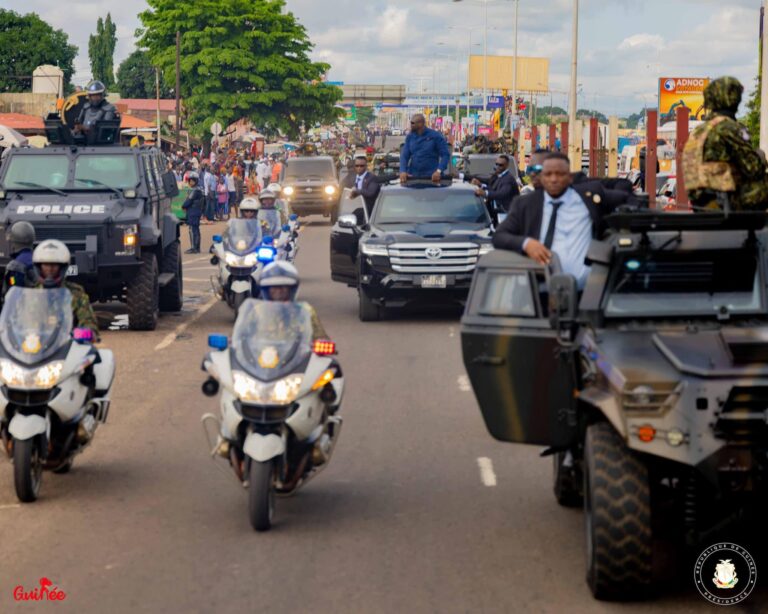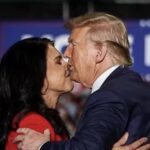The junta led by Gen. Mamady Doumbouya has set Sept. 21, 2025 for a constitutional referendum—presented as the first step back to civilian rule, with national elections signaled for December 2025.
- What’s in the draft: A shift to a 7-year presidential term, renewable once; a move to bicameralism (new Senate); and a Special Court of Justice to try senior officials. Debate centers on provisions that appear to let Doumbouya run despite the transition charter’s spirit. The vote shapes the transition timeline, the electoral playing field, and investor sentiment around Guinea’s bauxite and Simandou iron-ore megaprojects.
Aims (official vs. political)
Official aimis to Restore constitutional order” and provide a legal frame for late-2025 general and presidential elections. Political aim: Consolidate the transition’s architecture in ways that retain executive primacy and keep options open for Doumbouya’s participation in the first post-transition election. The draft’s 7×2 term design and eligibility framing have triggered this debate.
The draft: key issues to watch
- Presidential tenure and eligibility
- 7-year term, renewable once—a marked change from the 2010 model and criticized for entrenching presidential dominance.
- The text would allow Doumbouya to run, clashing with the transition charter’s intent (notably Article 46 debates).
- Institutional redesign
- Bicameral parliament: a new Senate representing local governments/socio-professional groups; supporters say it checks centralization, critics note cost and presidential appointment of one-third of senators.
- Special Court of Justice for high officials (including the president) in cases of malfeasance or “high treason”—a response to long-standing accountability gaps.
- Electoral rules and actors
- Creation of a Directorate-General of Elections (DGE) to run the referendum and subsequent polls—amid concerns over media restrictions, party suspensions, and civic-space shrinkage.
- Legitimacy and process
- Opposition and civil society (notably the Forces Vives de Guinée) question inclusiveness and the compressed calendar, after missed 2024 deadlines and ongoing clampdowns.
Results forecast (what’s most likely)
- Baseline expectation: Approval is likely, given state control over the process, fractured opposition, and the DGE’s managerial role. Expect turnout to be the battleground— opposition may emphasize abstention to undercut legitimacy rather than chase a “No” win.
- Risks to the baseline:
- Urban boycott or protest disruptions in Conakry if rights curbs intensify.
- Administrative/logistical frictions if the new electoral machinery under-delivers on transparency.
Consequences (short- to medium-term)
If the draft passes
- Transition timetable locks in: Legal basis for December 2025 elections; referendum outcome will shape the eligibility debate and campaign dynamics immediately.
- Executive-heavy equilibrium: A 7×2 presidency plus an upper chamber partially appointed by the president likely consolidates executive leverage—even as the Special Court adds an accountability signal.
- Market/investor read-through: A “Yes” with manageable street temperature could reduce headline risk for Simandou and bauxite—projects where Chinese and Western consortia are racing for 2025–26 first shipments.
If the draft falters or turnout collapses
- Transition slippage: December elections likely slide; ECOWAS and partners press for renewed consensus on rules, with heightened risk of polarization and unrest
- Economic chill: Greater uncertainty around mining timelines and contract sanctity; softer risk appetite from lenders and offtakers.
Stakeholders and interests:
Domestic
- CNRD / Transitional presidency (Doumbouya) — seeks controlled liberalization that preserves freedom of maneuver (including potential candidacy).
- CNT (transitional legislature) — architect of the draft; presents reforms as a “break” with past dysfunctions.
- Forces Vives de Guinée (opposition/civil society coalition) — challenges the process as exclusionary; leverages protests/abstention and international advocacy
- Media, unions, civic groups — constrained operating space; their ability to mobilize or monitor affects turnout and legitimacy narratives.
Foreign
- ECOWAS / AU — priority is timely, credible sequencing and de-escalation; ECOWAS urged dialogue to fix technical/political rules before votes.
- China-aligned consortia (Simandou, bauxite) — favor predictability and continuity; Chinese partners (Baowu/Chinalco-led blocs) are deeply embedded in Simandou and bauxite offtake.
- Western miners and financiers (Rio Tinto, lenders) — seek legal clarity and stable governance to keep 2025–26 first ore on track.
- Russia/UAE players in alumina/bauxite (Rusal, GAC/EGA) — watch for refining obligations and contract stability; policy shifts ripple through refinery and port investments.
- EU/U.S. — emphasize procedural legitimacy and rights; calibrate support/sanctions post-referendum depending on inclusion and media space
Indicators to monitor (Aug–Nov 2025)
- Referendum operations: voter registry audits, observer access, parallel vote tabulation (if any), media access rules.
- Eligibility clarifications: formal guidance on whether transition figures can stand; any legal challenges referencing the charter’s Article 46.
- Street temperature: protest authorizations, arrests, and internet throttling around Conakry.
- Mining milestones: Simandou rail/port readiness and offtake signals that hinge on political stability.
Bottom line
- The referendum is likely to pass, but its legitimacy will hinge on turnout, media freedom, and inclusion. Substantively, the draft locks in longer presidential cycles and new institutions while keeping ample executive space—shaping who can compete in December and how Guinea manages a high-stakes resource boom.
A constitutional referendum scheduled for September 21, 2025 creates a set of clear winners and beneficiaries:
1. The Transitional President and CNRD (Mamady Doumbouya’s junta)
- Why:
- The draft introduces a 7-year presidential term (renewable once), longer than the 5-year cycles in past constitutions.
- The text is framed in such a way that it likely does not exclude Doumbouya from standing in the post-transition election, despite earlier pledges that junta leaders would be ineligible.
- Benefit: Consolidation of executive power and a legal pathway for Doumbouya to legitimize his rule through elections, while keeping the presidency dominant.
- Risk: This makes the CNRD the primary target of opposition mobilization, but also the key beneficiary if turnout is strong enough for a “Yes” vote.
2. Political Elites Aligned with the Junta
- Why:
- The creation of a bicameral legislature (with a Senate partly appointed by the president) ensures that political elites and loyalists gain new institutional footholds.
- Expanded opportunities for political patronage through appointments and Senate seats.
- Benefit: Doumbouya and allies can embed loyal cadres into state structures, consolidating influence even if political competition later intensifies.
3. Military and Security Apparatus
- Why:
- The referendum process is managed under the junta’s tight control, with a new Directorate-General of Elections seen as aligned with military oversight.
- Security forces benefit from the extension of the transition, budget allocations, and a role in “managing order” during and after the vote.
- Benefit: The army maintains central political relevance, delaying a full return to civilian supremacy.
4. Foreign Economic Partners (China, UAE, Russia, partly Western firms)
- Why:
- For China, stability is crucial to move forward with Simandou iron ore mega-projects and long-term bauxite contracts. A “Yes” vote provides predictable conditions.
- UAE and Russia have alumina and bauxite refining interests, benefiting from legal clarity and reduced risk of contract renegotiation.
- Western companies (Rio Tinto, financiers) stand to benefit if the referendum locks in December 2025 elections and stabilizes investment terms.
- Benefit: Resource investors get reassurance that Guinea will not spiral into prolonged instability, even if democracy remains shallow.
5. Certain Civil Society & Local Government Actors
- Why:
- The draft introduces a Senate partly representing local governments and socio-professional groups.
- Though controversial, this gives some civic groups and municipal actors an institutional platform they lacked.
- Benefit: More channels of representation, albeit filtered through presidential appointments.
Who does not benefit
- Opposition parties and Forces Vives de Guinée: They remain suspended or heavily restricted and see the referendum as a way of sidelining them.
- Urban youth and protest movements: They risk repression if they challenge the process.
- Media and NGOs: Civic space is still narrow, so they are likely excluded from meaningful influence.
✅ Bottom Line:
The referendum’s primary beneficiaries are Doumbouya and the CNRD, followed by aligned political elites, security forces, and foreign investors who prize stability over democratic depth. Opposition, civil society, and pro-democracy actors stand to lose, unless they can leverage boycott campaigns to delegitimize the outcome.
The referendum proposals in Guinea (September 2025) contain a mixture of democratic language and authoritarian design, which makes their democratic quality highly questionable:
1. Positive / Democratic Elements
- New institutional structures: The draft includes a bicameral legislature (National Assembly + Senate), with some representation of local governments and socio-professional groups. On paper, this could broaden representation.
- Civil society inclusion (formally): The idea of giving civil organizations and local actors a role in the Senate mimics participatory democracy.
- Time-limited presidential terms: The constitution sets a maximum of two terms (even if each is now 7 years). Theoretically, this prevents indefinite re-election.
2. Weak Democratic Aspects
- Term length extension: Moving from 5 to 7 years reduces electoral accountability and increases the power of the presidency.
- Eligibility loopholes: There is no clear exclusion of current junta leader Mamady Doumbouya from running. This undermines the spirit of the transition and entrenches the military’s dominance.
- Presidential dominance: The president retains broad appointment powers (notably in the Senate), centralizing control over the legislature and weakening checks and balances.
- Election management: The new Directorate-General of Elections is not independent and is widely seen as aligned with the junta, which jeopardizes free and fair voting.
3. Democratic Deficits in Practice
- Suspension of opposition parties: Since 2021, opposition parties remain restricted, with some still banned from open political activity. Holding a referendum under these conditions cannot be considered free competition.
- Civil society repression: Protests against the junta have been repeatedly repressed, with dozens killed since 2022. This casts doubt on whether dissent against the referendum will be tolerated.
- Media environment: Press freedoms remain constrained, and state messaging dominates the referendum narrative.
4. International Standards
By global benchmarks (e.g., Venice Commission, African Charter on Democracy), the referendum proposals fail key tests of democratic legitimacy:
- Inclusivity: Opposition is excluded from drafting and campaigning.
- Transparency: Electoral oversight lacks independence.
- Accountability: The extension of presidential powers without balancing reforms tilts the system toward authoritarianism.
While framed as a step toward constitutional order, the referendum is largely a managed process designed to consolidate Doumbouya’s rule. It introduces pseudo-democratic features (a Senate, local representation, term limits on paper) but in practice it weakens checks and balances, entrenches the junta’s dominance, and limits real political pluralism.
It is not democratic in substance, even if the process carries the symbolic legitimacy of a national vote.




